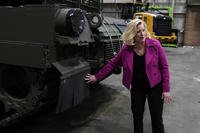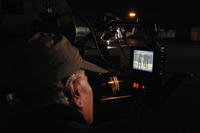I was clearing out my in-box when I noticed this note: EDITORS ALERT: The American Forces Press Service recalls the article titled DoD Officials Urge Use of Non-lethal Weapons in Terror War by Jim Garamone, published Sept. 27, 2006. The article contains inaccurate information and should not be used. Usually, news services correct innacurate information. The Armed Forces Press Service didnt do this, however, they just withdrew the entire article from their site. The great thing about the Internet, however, is that the article lives on through other websites. Ive attached the full article below.
Usually, news services correct innacurate information. The Armed Forces Press Service didnt do this, however, they just withdrew the entire article from their site. The great thing about the Internet, however, is that the article lives on through other websites. Ive attached the full article below.
Among other interesting tidbits, the article quotes a senior Pentagon official noting that the Chemical Weapons Convention constrains military personnel from offensive use of riot-control agents (like tear gas). This follows up on earlier debate, described in this article from 2003 in the New York Times, on President Bush authorizing tear gas for defensive operations (something presumably not in violation with the convention).
The sticky issue is when you use riot control agents for offensive operations and judging from this Armed Forces Press Service article, thats the road theyre going down.
DoD Officials Urge Use of Non-lethal Weapons in Terror War
By Jim Garamone American Forces Press Service
WASHINGTON, Sept. 27, 2006 DoD officials today urged a change in policy that would allow U.S. servicemembers to use tear gas and other non-lethal weapons in the global war on terror. Joseph A. Benkert, principal deputy assistant defense secretary for international security policy, and Air Force Brig. Gen. Otis G. Mannon, deputy director for special operations on the Joint Staff, spoke to the Senate Armed Service Committees subcommittee on readiness and management.
At issue is an Executive Order issued in 1975 that forbids American servicemembers first use of riot control agents in war, except in defensive military modes to save lives. The policy further states that all use of riot control agents in war is prohibited unless such use has presidential approval in advance.
An amendment in the fiscal 2006 National Defense Authorization Act the Ensign Amendment after subcommittee chairman Nevada Sen. John Ensign takes non-lethal weapons for riot control out of this prohibition.
Benkert said officials want to assure that our men and women in uniform have the full range of options available to them to carry out their missions.
Benkert stressed that the riot control agents he was talking about are not listed in a Chemical Weapons Convention schedule. He is referring to such non-lethal weapons as tear gas and pepper spray. He also said his testimony did not address other non-chemical, non-lethal weapons such as foams, water canons, beanbags or rubber bullets.
It may be difficult for many Americans to understand why their armed forces can use riot control agents only in defined circumstances when they see their local law enforcement agents using them effectively every day, Benkert said. The United States military must operate within the parameters of the Chemical Weapons Convention and Executive Order 11850, which constrain the ability of our armed forces to use riot control agents in offensive operations in wartime and obviously do not apply to our colleagues in law enforcement.
Benkert and Mannon stressed that even when allowed to carry these weapons, DoD personnel go through exhaustive and comprehensive training on their use. He said they also receive training in the law of war and applicable Geneva Conventions implications. The Department of Defense has issued regulations, doctrine and training materials providing guidance as to when riot control agents may be used, he said.
Before U.S. military personnel may use riot control agents, they must have proper authorization. The president must approve any use in war in a defensive military mode to save lives.
Under various circumstances, in light of the changing environment in which armed conflicts are taking place, in such a dynamic environment the peacekeeping, law enforcement and traditional battlefield roles of deployed units may be present at different times within the same theater of operations, Benkert said. The use of riot control agents will be evaluated based on the particular unit or mission involved and the particular facts and circumstances of the mission at the requested time.
-- Sharon Weinberger (cross-posted at Imaginary Weapons)
UPDATE 4:35 PM: Noah here. In his tesitmony, Benkert noted that "It may be difficult for many Americans to understand why their Armed Forces can use riot control agents in only defined circumstances when they see their local law enforcement agencies using them effectively every day." I'm one of those Americans. So I asked Edward Hammond, who heads up nonlethal-weapon-watching Sunshine Project for his thoughts. Check out his answers after the jump.
1) "Non-lethal" chemicals historically used by militaries to as
multipliers of lethal force, not to save lives. Examples: WW1,
Vietnam.
2) It's a "gas attack". Perception, justified or not, on the part of
the recipient that s/he has been attacked with chemical weapons. PR
liability and possibility of retaliation "in kind" thus resulting in
RCA [riot control agent] use prompting (or serving as the excuse for) use of CW [chemical weapons].
3) Escalation of violence. RCAs are pretty indiscriminate and, when
not used to help kill, are frequently used to impede people from
expressing their opinion, airing their grievances. I'm certainly not
a field commander in Iraq, but I cannot help but think that any sane
US officer dealing with civilian unrest in Baghdad or elsewhere would
not want to have CNN and Al Jazeera airing footage of US soldiers (or
Iraqi soldiers effectively under US command) lobbing gas at crowds of
Iraqis...
4) Much the same military hardware might have a far different
chemical payload. I submit that it's a good idea to keep militaries
as far away from (bio)chemical delivery devices as possible. If we
start back down this road...
5) The CIA listed an Iraqi facility experimenting with CS [2-chlorobenzalmalononitrile, a riot control agent] bombs (see
item #1) on its list of Iraqi WMD sites prior to the invasion.
Hmmm... How is it that an Iraqi military CS bomb is WMD; but the US
says its military CS is exempt from the CWC? Is it that CS is legal
in US miltary hands but not others? I don't think so .... Help me
out here, Secretary Rumsfeld, why do we have two standards?








